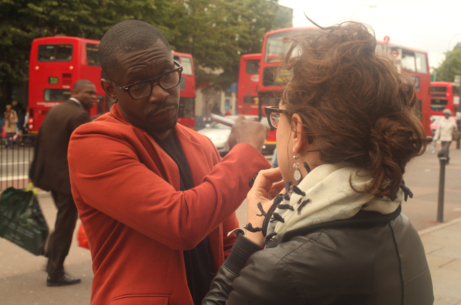
Derron Wallace's research and activism focuses on building a sense of neighbourliness. To that end, he is researching education of second generation Caribbean communities in the UK and US while devoting his weekends to community projects in London.
Derron Wallace’s research trip to Ethiopia didn’t begin well. The person he stayed with was arrested and Derron was not allowed to access any of his belongings or his room.
He had no money, no food and nowhere to stay. He went to a local barbershop and spoke to residents there, many of whom gave him food and help without him having to ask for it. Derron says: “These urban Ethiopian communities seemed organised and conditioned to care for others.”
His experience in Ethiopia and other parts of the world showed him how important neighbourliness, networks, and negotiating are. It is this concept which is at the root of his academic work and activism, with his PhD research focusing on how organised communities can improve the educational outcomes and experiences of disadvantaged groups.
Derron [2010] is also actively engaged in community projects. He spends his weekends in London where his wife, Danya, is doing a master’s in creative writing at Goldsmith’s College. He became involved in community organising in Lewisham before he started his PhD at the University of Cambridge. It was the year after teenager Jimmy Mizen was murdered in the borough.
His community work focuses on building leadership capacity for a community-led safety scheme, which creates safe havens for teenagers coping with the threat of violence. Derron also works on training clergy from Black Majority churches to integrate the skills of community organising into their outreach efforts. His work was recently recognised in an article in The Guardian.
He says that his community work has kept him grounded. “I am aware that my PhD is not just about knowledge production,” he says, “but about social change as well. This is why I want to keep a balance between my scholarly activities and engagement with urban communities.”
Personal experience
Derron’s work is also shaped by his migration experiences. He was born and raised in Jamaica until he was 15 when he moved to the Bronx, New York.
Derron went to a public high school in New York and won a scholarship from the Posse Foundation to study at Wheaton College, a liberal arts college in Massachussetts. He was majoring in economics and planned to be an investment banker. To this end, he did internships at Lehman Brothers over two summers.
However, a trip to South Africa transformed his life plans. “It opened my eyes to broader global political challenges and I decided to turn down Lehman Brothers’ offer,” he said. He returned to his college and created his own course in Sociology and African Diaspora Studies.
The following summer he went to Tanzania and worked in an orphanage, setting up a sustainable funding stream for it. He then returned to finish his studies in 2007. After winning a one-year fellowship from the Thomas J Watson Foundation he spent the next year looking at how Pentecostal churches serve the poor. “I wanted to understand the extent to which engaged Pentecostalism was being formed and challenged as a result of global, political, economic, environmental trends,” he says.
Derron, who was brought up in the Pentecostal church, travelled to Ethiopia, Guatemala, Trinidad and Tobago, Rwanda, Ghana and Uganda and visited over a 1,000 churches for his research.
His main finding was that countries with relatively stable democracies were far less engaged with social and political issues as they did not “have tragedy on their doorsteps”. “The more struggles there were in a country the more engaged the faith communities were, no matter the tradition,” he says. He describes the situation in Guatemala where there is a wide gap between rich and poor. “There’s a lot of wealth among the poor in Guatemala in terms of the range of ideas and local leaders commitment to collaboration,” he states.
He knew at that point that he wanted to further his studies in the UK. However, before he settled down to his studies, he travelled to South East Asia, one of the main regions he had not covered in his previous research, to further his knowledge of Pentecostalism around the world. He taught in a rural school in Thailand for nine months, during which time he looked into how educational reform could be funded there for the most marginalised communities.
He returned to the UK to do a Master’s in Education at Cambridge pursuing this issue and spent a month in Rwanda working for the Ministry of Education where his interest was in students who were marginalised due to disability. “It showed me how war-torn countries like Rwanda have to think very carefully about what the best opportunities for the country are in the long term and the politics of trying to implement educational reform,” he says.
For his PhD in Education he is focusing on the experiences of second generation Caribbean immigrants in the US and UK and how they are marginalised within the education system.
He says: “You have to understand the politics of the different places and how their schooling experiences are shaped by place. All my work is rooted in creating a better place, in classrooms and communities.”












